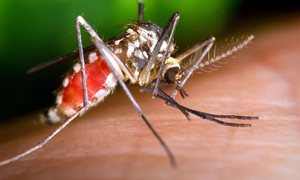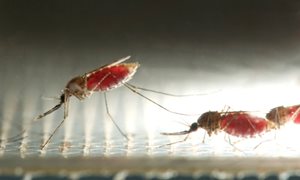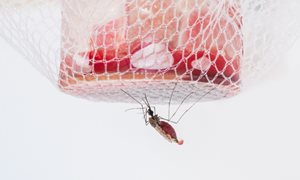 The Tropinhi Consortium has received a €1.5 million grant from the European Regional Development Fund (ERDF). The consortium will use the grant to develop new treatments against infectious tropical diseases such as malaria, dengue and zika. Tropinhi is a framework of cooperation involving Radboud university medical center, Radboud University and the spinoffs Protinhi Therapeutics and TropIQ Health Sciences, which are located on the NovioTechCampus.
The Tropinhi Consortium has received a €1.5 million grant from the European Regional Development Fund (ERDF). The consortium will use the grant to develop new treatments against infectious tropical diseases such as malaria, dengue and zika. Tropinhi is a framework of cooperation involving Radboud university medical center, Radboud University and the spinoffs Protinhi Therapeutics and TropIQ Health Sciences, which are located on the NovioTechCampus.
Mosquito medication
CEO of TropIQ Koen Dechering, who is coordinating the research project together with chemist Martin Feiters of Radboud University, explains: “Malaria treatments are available, but the parasites are developing resistance to them. Moreover, these medications control only the parasites in people, not in the mosquitos. An effective approach to malaria requires new medications that prevent mosquito-borne transmission of parasites. We now have good candidates for such medications, and with this consortium we can accelerate their development.”
Most vulnerable patients
Protinhi is developing a medication against dengue fever and related viral diseases such as zika. Bernd van Buuren, CEO of Protinhi, explains: “No medication is currently available to treat dengue or zika. For dengue, a partially effective vaccine is available, but it cannot be used for the most vulnerable patients: children under nine years. A therapeutic medication is therefore urgently needed to combat these diseases.”
Protease inhibitor
The dengue virus proliferates by having its genetic material read by the infected cells of the patient. This results in large viral proteins that are cut into smaller pieces by proteases. These small proteins drive the production of new virus particles, which subsequently infect new cells. According to chemist Martin Feiters, co-founder of Protinhi: “During the cutting and splitting of those large proteins, proteases from both the virus and the patient are involved. We are working on a medication that specifically inhibits the dengue protease. As a result, we can control the virus with few or no side effects for humans. Together with Ronald van Rij at the Department of Medical Microbiology of Radboud university medical center, we are looking for the best way to work with these new dengue virus inhibitors. We have good evidence that we can also use this technology to develop new medications for both malaria and zika.”
Virus transmission
The research group of Ronald van Rij at Radboud university medical center specialises in mosquito-borne viruses, such as the West Nile virus, dengue and chikungunya. Van Rij: “Our research focuses on host factors, both in humans and mosquitoes, which impact the efficiency of virus transmission. This enhances our understanding of virus transmission by mosquitoes. In addition, this knowledge is crucial to the development of effective medications.”
Public-private partnership
Due to the public-private partnership, Tropinhi (a conjunction of TropIQ and Protinhi) can make optimal use of the vast knowledge that is available in Nijmegen on infectious diseases and their control. For example, the Department of Synthetic Organic Chemistry at Radboud University has expertise in designing and building organic molecules; subsequently, the companies in the consortium can test, develop and potentially market these as new pharmaceuticals. And Radboud university medical center provides fundamental knowledge about the interaction of the potential medications with viruses and parasites in the human body and can also test their effects in animals and people.
Employment opportunities
In this way, the ERDF grant will promote effective collaboration in tropical infectious diseases. The funding impulse is also expected to provide new employment opportunities for the eastern Netherlands region. In the short term, this will result in additional research employment for highly educated knowledge workers. If the research results are positive, in the long term this will also lead to more employment in product development.
More information on
TropIQ Health Sciences
Protinhi Therapeutics
Onderzoekslab Ronald van Rij
EFRO
-
Want to know more about these subjects? Click on the buttons below for more news.
Related news items

Grants for research on magnesium deficiency and malaria Vidis for Felix Hol and Jeroen de Baaij
1 July 2022 Radboudumc researchers Jeroen de Baaij and Felix Hol both receive an NWO Vidi grant for their research, respectively on magnesium deficiency in type 2 diabetes and on malaria. go to page.aspx?width=800&height=533&ext=.jpg&type=BlockColumn1Zoom1)
New test for Lyme disease is not reliable
15 June 2022 To determine whether someone has Lyme disease, doctors in the Netherlands often use antibody tests. For some time now, so-called cellular tests have been available on the market. However, the VICTORY study published in The Lancet Infectious Diseases has found that these tests are not reliable. go to page
Field research on malaria vaccine offers unexpected surprise
23 May 2022Field research on the effectiveness of a malaria vaccine, came up with unexpected results for an international group of researchers including Benjamin Mordmüller of Radboudumc. The vaccine evokes a broader response against malaria proteins than there are in the vaccine.
go to page


